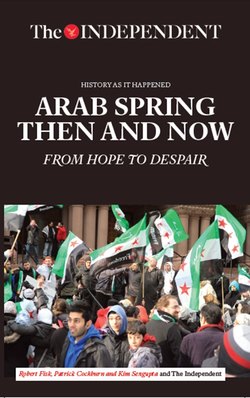Читать книгу Arab Spring Then and Now - Robert Fisk - Страница 6
На сайте Литреса книга снята с продажи.
ОглавлениеFOREWORD
Saturday, 31 December 2011
ONE MAN WHO CHANGED THE WORLD IN 2011
In truth, Mohammed Bouazizi only survived a few days into 2011. On 4 January, in a coma and swathed in bandages that covered his terrible burns, he died in a hospital near Tunis, aged just 26. He was an ordinary man, just a humble fruit vendor trying to make an honest living and support his family.
On 17 December 2010, however, after one routine petty harassment too many from the authorities, something inside his long-suffering soul snapped. He dowsed himself in petrol and set himself ablaze. In doing so he lit a fire across the Arab world that blazes to this day.
His act of self-immolation stirred protests in his home town of Sidi Bouzid, that quickly spread across all Tunisia. In a bid to save his regime, President Zine El Abidine Ben Ali, who had ruled the country for the previous 23 years, paid a visit to Bouazizi's bedside a few days before he died. But on 14 January, Ben Ali was swept from power.
The 'Arab Spring' had started. The protests spread first to Egypt, where President Hosni Mubarak would be ousted on 11 February, then to Libya, Yemen, Bahrain and Syria. Some regimes made reforms, some resisted, and some were toppled. But not a single one was unaffected.
Anyone familiar with the Arab world had long known that sooner or later its problems - corrupt regimes that tolerated no independent political movements, feeble economies and mass unemployment in populations in which two-thirds were aged under 25 - would explode. But no one knew when or where the spark would come, still less that it would be provided by Mohammed Bouazizi.
His father died when he was aged three, and though his mother remarried, his stepfather was in poor health and unable to earn. The son attended secondary school, but left to become the main provider for his family, selling fruit and vegetables from a barrow in Sidi Bouzid's market. The young Mohammed was liked by everyone. He was honest and hardworking, trying to give his younger siblings the chance to stay at school. "My sister was the one in university - he would pay for her," his sister Samia said, "and I am still a student and he would spend money on me."
Bouazizi tried to join the army, but was turned down. Efforts to find a regular civilian job met a similar fate. So he was stuck with being a street vendor; every day, he went to the market and bought produce, before pushing his barrow to the local souk. The day's work done, he went back to his family, trying to forget the police who would often make his life a misery because he didn't have the money to bribe them off. And so life went on. Until 17 December, 2010.
That day, he was harassed again, and hauled before a more senior police official, Faida Hamdi, who confiscated his cart and scales. According to Bouazizi's family, either she or her subordinate officers slapped him and insulted his dead father. That this humiliation was directly or indirectly inflicted by a woman only made it worse. He tried to complain to Hamdi's superiors, but they wouldn't see him. Despairing, Bouazizi bought a can of petrol, returned to the municipal building and set himself on fire.
In 17 days, he was dead. The authorities tried to keep the funeral private, but 5,000 people attended. Today, Bouazizi is a symbol of the quest of people throughout the region for human dignity and freedom. The main square in Tunis has been renamed after him; the European Parliament posthumously awarded him its Andrei Sakharov Prize.
The story has not a happy ending. Syria's agony continues, while Egypt's 'caretaker' military has dragged its heels on giving up power; repressive autocracy could yet return in another guise. Back in Sidi Bouzid the mood is sour, too. A few months after his death, Bouazizi's family moved to Tunis, prompting some neighbours to accuse them of turning their backs on their home town, to cash in on their fame. There were even rumours that he hadn't meant to set himself on fire, that he had been drunk.
Nonsense, his friend Mohammed Amri told reporters, almost a year after Bouazizi's death. He was "a serious man who had one dream - to work, buy a car and build a house", he added. Modest goals, but in an Arab world denied them for decades, enough to spur a revolution.
Rupert Cornwell
Editor’s Note: Mohammed Bouazizi was one of the ten best “People who changed the world” in 2011, nominated by writers of The Independent.
